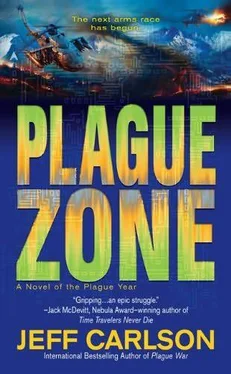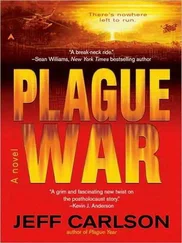They’d found early models of the vaccine. They inserted one substrate after another into the MAFM, Kendra using Deborah as her hands, talking to her, thinking with her. Deborah was impressed by her momentum. Kendra identified the fifth and eighth samples as ideal. Then she’d sketched on the notepad, solidifying her concepts. Deborah thought the drawing looked like a tadpole. It had one long-necked curl above an oval body, meant to swim and hunt, but first Kendra needed to build it and she’d grimaced when two laptops denied her, lacking the necessary passwords. At last she’d accessed the third, mumbling in Chinese with a laugh. That was the first hint something was going wrong. Her movements became stuttered, even manic. She spoke to Deborah again — in the wrong language.
Kendra had brought up twenty files and discarded fifteen more while Deborah struggled to grasp their significance, recognizing nothing. The other woman’s mind simply outpro cessed her own, but it was also fragmenting at that speed. “We can program the MAFM to assemble a bastardized nano from preexisting work,” she’d said. “We’ll save hours. But first I need to… What if we… No.”
Then silence. Kendra stopped. Deborah didn’t know where she’d gone. Each breath felt like pressing on eggshells. Deborah thought she could bring Kendra back with a word or a touch, but what if that was a mistake? She might disrupt whatever calculations were taking place. Above all, it was important not to frighten the ugly witch.
They couldn’t rely on her, and Deborah wondered what Kendra would do when the shooting started.
Jia’s Z-9 lifted away from the hospital as he finished his radio call. “Our people at point one were killed by enemy action,” he said through heavy static, glancing at the Elite Forces on either side of him. “I say again, our people at point one were killed by enemy action, over,” Jia said, inciting his men as much as confirming his report. In the faintest green light reflecting from the cockpit instruments, their eyes were beautiful, feral and bright.
The Z-9 was a small-bodied aircraft. Jia had only five soldiers in addition to the pilot and copilot, both of whom were commandos themselves. The other chopper also held eight men. Jia would have preferred an army, and he’d minimized any risk to his troops after their first pass over Saint Bernadine. The evidence had been grotesque even at a distance. Through night-vision goggles, they’d seen liquefied corpses all over the courtyard and an overturned Z-9 in the rubble nearby.
One of the dead had drawn his sidearm. That was enough for Jia. The corpses looked melted, and nobody fought runaway nanotech with a pistol. Qin was right. Impossibly, Qin was right. The Americans had infiltrated far into the Los Angeles basin, surprising the lab personnel. Most likely the Americans were already gone, fleeing with invaluable data and prisoners.
Where? How?
The anger Jia felt was unseemly, directed as his own people as much as the enemy. He could have protected this place if he’d known it was within reach. The men above General Qin had no right to blame him for this loss, but they would. It made him feel ever more attracted to Qin’s cabal.
Jia had ordered both helicopters down only to preserve his fuel, landing in reasonably stable depressions in the wreckage. Then he’d dispatched a three-man team to scout the enormous hospital building. He hated to linger, but they needed to clear this site first. It was the higher priority of the two.
His troops had returned in ten minutes and confirmed his first impression. There were no survivors. Inexplicably, though, there was a significant amount of gear, briefcases, and laptops stacked in the hospital’s lobby. Jia turned this information over and over in his head as they droned south. Why would the Americans leave this material behind? Even if their aircraft had been unable to carry it all, why not destroy it?
“Sir, there’s another helicopter in the ruins ahead of us,” the pilot said, glancing back at Jia.
“Proceed to target.”
They could collect their dead later, along with whatever equipment and clues remained. Jia was sure the second site had been attacked, too, but he needed to go through the motions of physically verifying it. A fool’s errand. This was how his life would end, cleaning up other men’s errors before they condemned him for their own mistakes. His disappointment was sickening, yet he thought, I’ll do my best. Perhaps it will be of some help to Qin if we—
“Watch out!” the copilot cried.
Two rocket trails lanced through the night. The fiery streaks went wide and cut past Jia’s helicopter as the rotors howled, the pilots reacting after the fact. The aircraft banked hard to Jia’s left, but the joy he felt wasn’t for escaping.
The Americans are still here! he thought.
His retinas burned. Both rockets had come from roughly the same place in the ruins. “There!” Jia yelled, pointing past the copilot’s helmet. The Z-9 had no armaments, but he wanted to avoid more incoming fire.
“I see them,” the pilot said as the copilot chattered into his headset, “We’re pulling left toward—”
A third rocket lifted from the earth directly in front of them. It slashed across the nose of Jia’s aircraft. The pilot shoved at the collective again, rocking them downwards. Then the night exploded.
“No!” someone yelled in the glare.
The rocket had struck the other helicopter and puffed away from its side in a long whipping cloud of fire and smoke.
Got ‘em, Cam thought. Three explosions lit the gloom like fireworks, although two of the RPGs landed in the ruins beyond the helicopters. Those bright pops of fire were disori enting because he expected them overhead. For a moment, his head reeled, trying to make sense of the distant flashes on the ground as a third, much closer light etched the shape of a Chinese bird into the sky.
The third shot was Medrano‘s, fired from somewhere to his right. It delivered only a glancing blow. The explosion seemed to bounce away from the helicopter’s side, but it was a killing strike. With infinite care, Medrano had bolted vials of the new machine plague to four of their rocket-propelled grenades. His RPG breached the aircraft. The nanotech did the rest. The helicopter shuddered, then spun away into the rubble below. The flames went out before it hit. Nor did it explode. But there was a solid wham in the dark.
Cam grabbed for another RPG against the wedge of concrete where he’d chosen to make his stand. They were closer to the labs than he liked, but they were afraid of being overflown, so they also wanted to be able to shoot at the campus in case the enemy got behind them.
The home’s foundation was exposed where its walls had been blasted away, creating a small, open corner for Cam to lay his arsenal, memorizing each weapon in line. If Alekseev had lifted a second launcher of his own, the Russian colonel held his fire. Cam couldn’t see the other man but he was fiercely aware of him and the others, too, like echoes of himself. In combat, they were as close as brothers.
“Save your round!” Alekseev called. “Save your round!”
“I hear you!” Cam shouted. This RPG was his last, and they were shooting blind. It was probably only their first shots, like tracer rounds, that had given Medrano an opportunity to zero in on the choppers. Now the surviving bird turned north, the sound of its blades slapping at the rubble.
Cam reached into the night with his ears and his bones, using his entire being as a tuning fork. He could track the vibrations. There, he thought. “Eleven o‘clock!” he yelled. “They’re at eleven o’clock!”
Читать дальше












